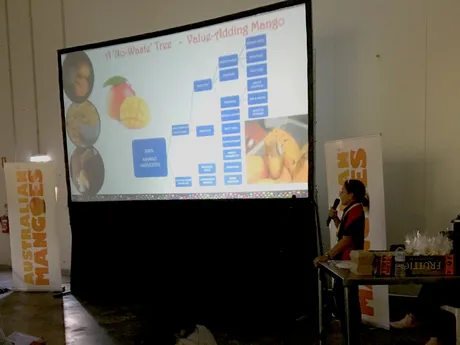Jo Bumbak is quick to admit that she finds eating mangoes "disgusting" - but still, it has not stopped her carving out a reputation as the "Mango Queen" across Western Australia.
From a third-generation farming family, she just loves working with the fruit (and fresh produce in general) at their property in the Gascoyne region. She proudly told the Australian Mango Conference that the award-winning Bumbak’s products even help promote tourism in the area.
"My aim is to preserve our family's horticulture heritage, and doing it by using our 'waste' product," Ms Bumbak said. "I use that waste product to make the most beautiful gourmet items. We have a reputation as a high-quality supplier. Everything that I do is home grown, and home made in Carnarvon with my hands. I often have customers walk in the door and say we have travelled 5,000 miles to get a mango smoothie, or that they have been thinking of me for years."

Ms Bumbak adds that the area around Carnarvon produces around 70 per cent of the state's fresh produce, and from that 40-60 per cent ends up as waste product.
"At Bumbak's we believe in utilising the farm waste," she said. "We basically have zero farm waste from mangoes, and we have reduced our waste by creating innovating ways and uses for it. We also purchase waste from other local growers - so we produce all the fruit and veggies that would normally be destined for landfill. We create a great range of products, and try to ensure there is no waste at the end. All our products are homemade, with no artificial colours, flavours or preservatives."
She explains that waste product is considered to be the product that is not harvested, or not used in the post-harvest for the fresh market. The business does not just specialise in mangoes, and also supplies other products including asparagus and dragon fruit. Ms Bumbak says that she gets so excited working with new products.
"It is usually the wrong size, shape, colour, it has a mark or blemish, is immature or over ripe" she said. "These fruits and vegetables are the most beautiful product because it is perfectly edible. I think they are even slightly more delicious, but they aren't quite pretty enough for the market. The taste, the smell, the flavours are still sensational."
Last summer, the region had some of the hottest weather that it has ever experienced on record, so nearly all mangoes had some form of heat damage. While most farmers were feeling the pain, Ms Bumbak was able to take advantage of the extra produce.
The value-added products made by Bumbak’s can be grouped into three main areas: fresh pulp, dried pulp and skins and seed.
"With the fresh pulp, we freeze it and turn it into smoothies and fruit cakes, and also gets turned into ice creams " Ms Bumbak said. "In our preserves, the fresh pulp is turned into jams, chutneys, dips, salsas and sauces. For the dried pulp we have mango leather, fruit curls and confectionery. With the skins and seed it took me a while to work out how I could use the waste product, and I learnt that I can make vinaigrette. We also use the mango as stockfeed and as green mulch and things like that. So, we end up with nothing left."
Each year Bumbak's process around 12-18 tonnes of mango pulp in a 6-8 week period, as well as picking a packing fresh mangoes at the same time.
"If I process a tray of premium grade mangoes, I can turn it into roughly $160 worth of gourmet products," Ms Bumbak said. "I love creating high-value products, and reduction of environmental impacts that this achieves. The other thing I like is giving local growers a cheque for their waste product, because quite often I can match the market price. For example, if they are selling tomatoes for 80 cents a kilogram at market; they have to pick it, pack it, and send it. I say to them I will pay them $1.20 per kilo, because I can make it into tomato salsa, or tomato chutney, which has high-value."
The business is expanding with plans for a new processing facility and cafe in addition to its tours, and is working with schools to help get students involved in utilising waste in the fresh produce industry.
For more information: www.facebook.com/bumbaks
